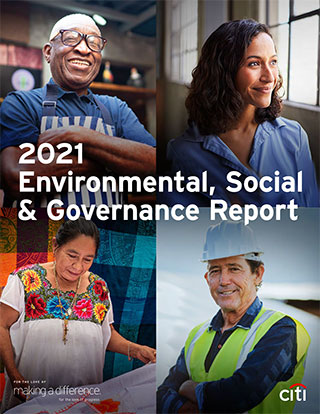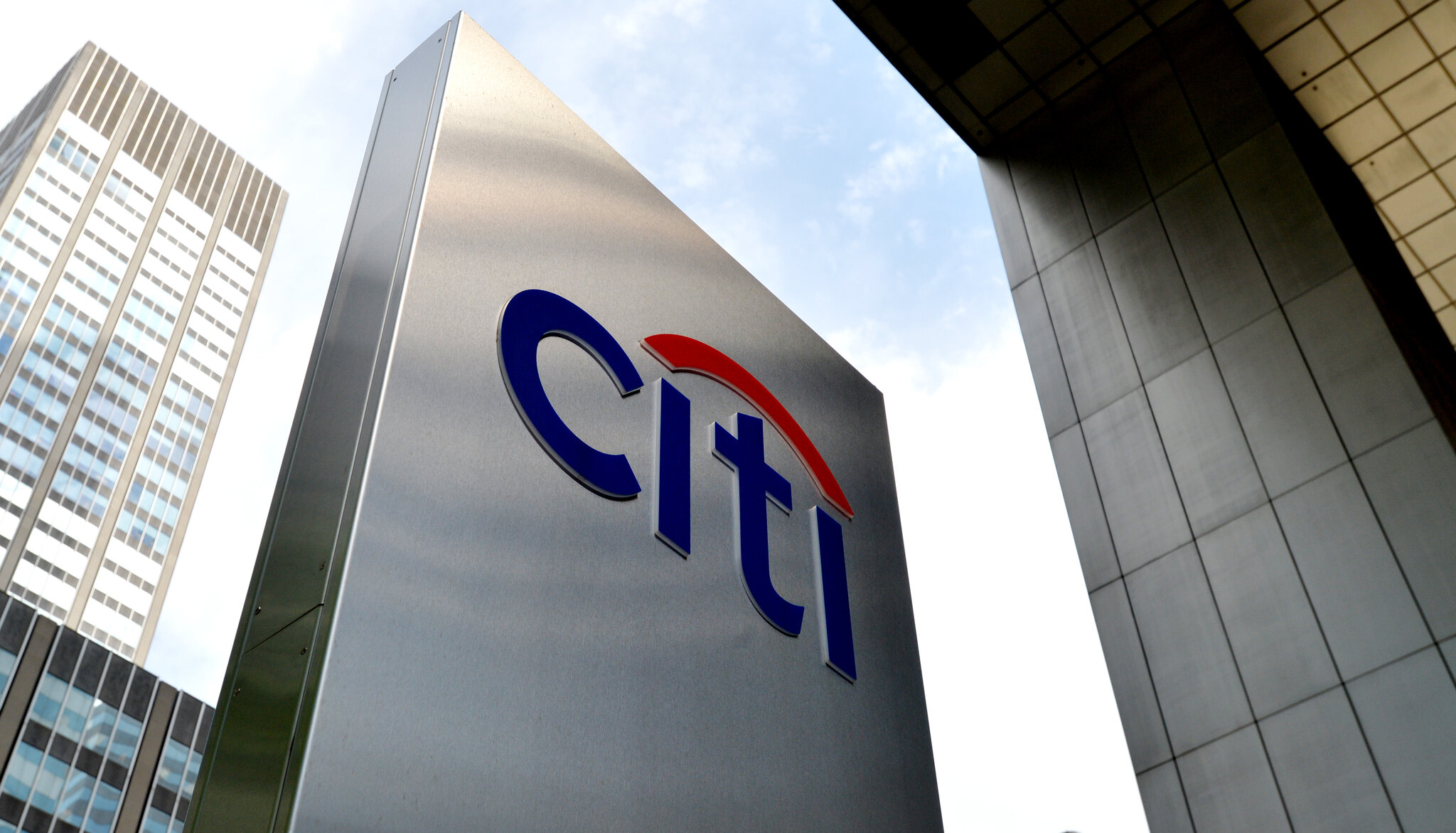The Environmental, Social, and Governance (ESG) Report for 2020 has been made public by Citi.
Citigroup Inc

Citi has just released its annual Environmental, Social, and Governance (ESG) Report for 2021. The report details the company's efforts to tackle some of the world's most pressing problems. Citi uses the Principles for Responsible Banking to inform its reporting.
Citi has just released its annual Environmental, Social, and Governance (ESG) Report for 2021, which details the company's efforts to tackle some of the world's most pressing problems and create more sustainable, diverse, and equitable communities in every region it serves. This report and the accompanying Executive Summary highlight Citi's efforts to address global events that are reinforcing the growing emphasis and interconnectedness of ESG considerations, as well as the company's progress toward its long-term ESG goals and commitments.
“From COVID-19 and climate change to systemic racial inequity and a transformational war in Ukraine, we continue to see the need for businesses like Citi to step up and help address the global challenges facing our society,”
said Jane Fraser, CEO, Citi.
“The health of our business is inextricably linked with the health of our planet and our communities, and we cannot succeed at one without the other. At Citi, this sense of responsibility continues to shape our decisions, business strategy and firm-wide goals and commitments.”
Citi's ESG Report, formerly known as Citi's Global Citizenship Report, has been released for the third time. Reporting against three applicable Sustainability Accounting Standards Board (SASB) sector standards was incorporated into the 2021 ESG Report, which was compiled in accordance with the Global Reporting Initiative (GRI) Standards: Core option. In addition to the UN Global Compact and the UN Guiding Principles on Business and Human Rights, Citi uses the Principles for Responsible Banking to inform its reporting. Read on for details on Citi's environmental, social, and governance initiatives:
Accelerating Sustainable Finance: In early 2021, Citi made a $1 trillion commitment to sustainable finance, which includes a $500 billion goal for environmental finance and a $500 billion goal for social finance, aligning with the agenda of the United Nations' Sustainable Development Goals. Through this commitment, Citi is financing and facilitating a wide range of activities – from renewable energy and clean technology to healthcare and affordable housing – to further the acceleration to a sustainable, low-carbon economy that supports the environmental, social and economic needs of society. In 2020 and 2021, Citi financed and facilitated a total of $222 billion in sustainable finance activity globally, which puts the company well on track to meet its $1 trillion commitment by 2030.
Driving the Transition to a Low-Carbon Economy: Earlier this year, Citi unveiled its initial plan to reach net zero emissions by 2050, a commitment made on Jane Fraser’s first day as CEO in March 2021. The plan includes disclosure of Citi’s baseline financed emissions and ambitious 2030 targets for its Energy and Power loan portfolios – a 29% absolute reduction in financed emissions for the Energy sector and a 63% reduction in portfolio emissions intensity for the Power sector. The plan also introduces Citi’s Net Zero Transition Principles, which are guiding its net zero efforts to drive a responsible and orderly transition that minimizes economic disruption while also contributing to broader sustainable development objectives. In 2021, Citi also co-founded the Net Zero Banking Alliance, which will help establish an industry framework for decarbonizing the banking sector.
Maximizing Positive Social Impact in Emerging Markets: Building on Citi’s longstanding expertise and commitment to advancing financial inclusion around the world, the company expanded the scope of its social finance efforts to support social initiatives in areas such as healthcare, education and basic infrastructure. In 2021, Citi issued a first-of-its-kind $1 billion social finance bond to support social and economic development efforts that increase opportunity and access to essential basic services in emerging markets. As part of Citi’s social finance focus, the company aims to invest in opportunities for 15 million households, including 10 million women, globally by 2025.
Deepening Efforts to Help Close the Racial Wealth Gap in the U.S.: As part of Action for Racial Equity, Citi and the Citi Foundation invested $1 billion in strategic initiatives, just one year into the three-year commitment. Through the $200 million Impact Fund, Citi directed 68% of its 2021 asset allocation to companies founded by women and/or racially/ethnically diverse founders, which supports the Fund’s goal to help combat the gender and racial/ethnic gaps that exist in venture capital. Citi also launched new initiatives to embed racial equity across Citi’s business to better serve its clients and communities, including the recently launched Diverse Financial Institutions Group – a dedicated team at Citi to lead and expand firmwide engagement with minority depository institutions, diverse broker dealers and diverse asset managers. In 2021, Citi also worked exclusively with five Black-owned firms to syndicate a $2.5 billion bond issuance.
Increasing Affordable Housing in the U.S: In 2021, Citi provided $5.64 billion in loans for affordable housing projects, making Citi the top affordable housing development lender in the U.S. for the 12th consecutive year, as published by Affordable Housing Finance.
Continuing Transparency around Pay Equity and Increasing Diverse Representation: In 2021, Citi promoted one of the largest and most diverse Managing Director classes in recent years – over a third of the total class were women and over a third in the U.S. were racial/ethnic minorities. Earlier this year, Citi disclosed its annual public update on pay equity, highlighting progress on median pay for women globally and U.S. minorities. Helping progress on this front, Citi announced it had exceeded its three-year aspirational diversity representation goals set in 2018 – increasing representation at the Assistant Vice President to Managing Director levels for women to 40.6% globally and Black representation for those same levels to 8.1% in the U.S. The company plans to set new representation and recruiting goals, expanding to new markets and other underrepresented groups.
“Over the past year, we made meaningful strides toward achieving the commitments we’ve set, despite the uncertain and volatile period we are living through,”
said Edward Skyler, Head of Global Public Affairs, Citi.
“We know that ESG considerations will only become more prominent as all of our stakeholders increasingly prioritize the need for our bank to help chart a sustainable and equitable future. Whether it’s through our Impact Fund, our plan to reach net zero or the work we do to support communities wherever we do business, we’ll continue to look for new and innovative ways to put our balance sheet to good use.”
To learn more about Citi’s ESG efforts, visit www.citigroup.com/citi/about/esg/.
Source: Citi group news






